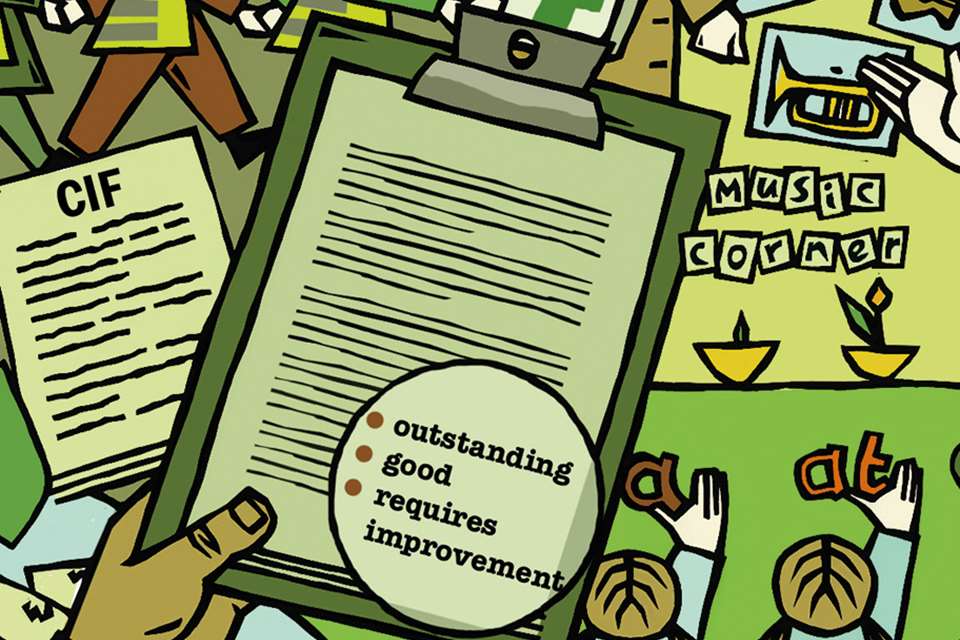Learning & Development: Inspections - Beyond Ofsted
Dr Julian Grenier
Monday, November 28, 2016
A positive inspection is vital, but so too are other measures of effective provision. By Dr Julian Grenier

A few weeks ago, I was talking to someone whose work I really admire. She is a highly successful leader in the early years, and she is also a practitioner who made a real difference to me when I met her many years ago, running a Stay and Play session in her nursery when my daughter was two years old.
I gained a lot of courage from her confidence to allow ‘visiting’ children to play alongside children on roll, and from the wonderful range of challenging experiences on offer inside and outdoors. So, I was a little surprised when she said to me, ‘We just had Ofsted again – it was my seventh, but I still feel really anxious and nervous every time.’
That’s exactly why I decided to write a book to support practitioners in thinking about and preparing for their Ofsted inspection. I wanted the book to be practical, and to be based on my own current, first-hand experience – including the work I have been doing as a National Leader of Education with early years settings. Because there is no doubt that Ofsted is really important to all of us, both emotionally and professionally. In fact, it has never been more important to have a successful Ofsted.
PRESSURES OF OFSTED
Early years settings may lose local authority funding for some places unless they are judged to be Good or Outstanding. Many parents who pay for childcare will look around first, using the Ofsted website, and may rule out anywhere that does not have a positive report. It will also be much harder to recruit good staff if you have been judged as Requires Improvement or Inadequate.
If you are in a maintained school, there are equal, if different, pressures. The specific early years judgement in the new school inspection framework means that a poor outcome for children in the EYFS could bring down the school’s overall grade. Ofsted has focused in recent years on transition in the early years, progress, and specifically the outcomes of children eligible for free school meals: shortcomings in any of these areas could have a very adverse effect on Ofsted’s overall judgement of the school.
For both schools and settings, Requires Improvement will lead to more regular monitoring and inspection. Being found Inadequate will lead to intense pressure: schools may be forced into becoming academies or federations, and settings may lose their registration, if they do not manage to improve rapidly. Complaints or concerns that you are failing to meet the Statutory Framework for the EYFS can also trigger no-notice inspections and lead to a poor grade, even for a school or setting that has previously been successful.
So, it may come as a surprise that although my book is about achieving success in your Ofsted inspection, it does not take Ofsted, or its current inspection frameworks, as the final word in best practice.
For a start, those frameworks, reports and public announcements change from one year to the next, depending on a whole range of other priorities, including the personal views of the chief inspector of schools. Instead, I argue that while Ofsted is important, we must not allow the tail to wag the dog.
WHAT REALLY MATTERS
What really matters is that we find ways to develop safe, effective and sustainable early years practice which meets the needs of the children and families we work with. We need to grow staff teams so that individuals work well together and develop their professionalism. And we need a range of techniques to collect information about how effective our practice is, so that we are constantly monitoring the quality of the provision and the children’s progress and well-being, and making adjustments where necessary.
These cycles of development should be robust and accurate, and we should be open with staff and with parents about how well we are doing and what we need to do to get better. Most importantly, we need to work together, as professionals, to develop the values and principles which will guide our work. No-one ever journeyed far by changing course every few moments, and no-one can offer children a high-quality experience of early education by making changes according to every fashion, whim or headline.
That said, Ofsted itself has consistently argued for some important principles: that children in disadvantaged circumstances should have the care and teaching they need, so that they have as good a chance to do well in their education as their more advantaged peers; that children should be kept safe and healthy; and that staff should be professionally led and managed so that they can develop their skills and professionalism.
Until a few decades ago, the regulation of early years settings was locally determined and inconsistent. Ofsted took over in 2000, and Peter Elfer, author and principal lecturer in early childhood studies at the University of Roehampton, has argued there is evidence to suggest that there has been a significant improvement in the safety of nurseries compared with before 2000, when inspection and enforcement were much weaker.
Alongside improvements in safety, regulation has also ensured that awareness of the importance of emotional well-being and the provision of a broad range of opportunities for play and learning is commonplace (Elfer 2014).
INSPECTION REGIMES
On the other hand, the pressure that is created by Ofsted’s no-notice and short-notice inspection regimes can lead to a defensive culture. Managers and staff set about trying to please Ofsted: decisions are taken on the basis of second-guessing what an Ofsted inspector may wish to see. In my role as a senior early years adviser, I would often ask staff why they used a particular format for their planning, or timetabled the day in a certain way, and would get a two-word answer: ‘For Ofsted.’ That is not a professional way to work or think.
Similarly, leaders and managers sometimes try to motivate or coerce their staff into a particular course of action because ‘it’s what Ofsted expects’. I call this approach ‘hiding behind the Ofsted monster’ – wouldn’t it be better if we led our teams to do what we think is right, and what the evidence supports?
So, in my book I argue that Ofsted’s framework and inspection system should not be seen as a guide to best practice, but instead as a way for you and your setting to validate your practice, and to be accountable for the public money you receive. Successive governments have invested many billions of pounds in early years provision: just think about all the children’s centres that have been built, the expansion of free places, and funding for staff training and development over the years. The public are entitled to know whether these are wise investments, and Ofsted is the main source the public rely on for this information.
We have come a long, long way in the early years since the 1980s when I first went into a nursery as a student on placement. The practitioners I have met over all those years have nearly always been incredibly committed and dedicated to the children and their families. But the professionalism of the workforce is very different now.
There are so many inspiring stories of practitioners who have shown a huge commitment to their professional learning, gaining Level 3 qualifications, degrees and more. We know enough, collectively, to keep on improving the quality of care and education in the early years. We are not ‘doing it for Ofsted’ – we are doing it for the children and for their families, and we should be confident and professional enough to welcome Ofsted in to validate our work.
READER OFFER
In Successful Early Years Ofsted Inspections, Dr Julian Grenier argues that it’s time to do what’s right for children and families, and build long-lasting and effective provision – instead of hiding behind the ‘Ofsted monster’ to get things done.
Up to date with Ofsted’s new Common Inspection Framework, the book focuses on developing your provision and team up to and beyond inspection day. It is accompanied by easy-to-use time-saving pro formas and self-reflective documents that can be downloaded online for free.
Professor Tina Bruce, CBE says, ‘The book provides navigational tools which help leaders and managers of early childhood practice, working in a range of settings, to find their way through the complexities of the work they do, and to deepen their sense of fulfilment in working with the children, families and staff as well as the challenges they deal with daily.’
For a 25 per cent discount, order at sagepub.co.uk and enter code UKEDUC25 at the checkout. (Valid until 31 March 2017 and can’t be used with another offer).
NW SHOW MASTERCLASS
Dr Julian Grenier will be joining self-regulation experts Professors Clancy Blair and C Cybele Raver at our NW Show masterclass ‘Closing the gap: three to five years’ in London on 3 February 2017. Professors Blair and Raver, both of New York University, will be discussing the neuroscience of self-regulation, the impact of the home environment and effective measures to help a child manage their feelings and behaviour. Dr Grenier will then assess the implications for best practice in the EYFS.
To find out more and see our full seminar and masterclass programme, visit: www.nurseryworldshow.com/london
REFERENCE
Elfer P (2014) ‘Social Defences in Nurseries’ in Armstrong D and Rustin M (Eds)Social Defences Against Anxiety: Explorations in a Paradigm. Karnac
[asset_library_tag 1352,Download the PDF]








